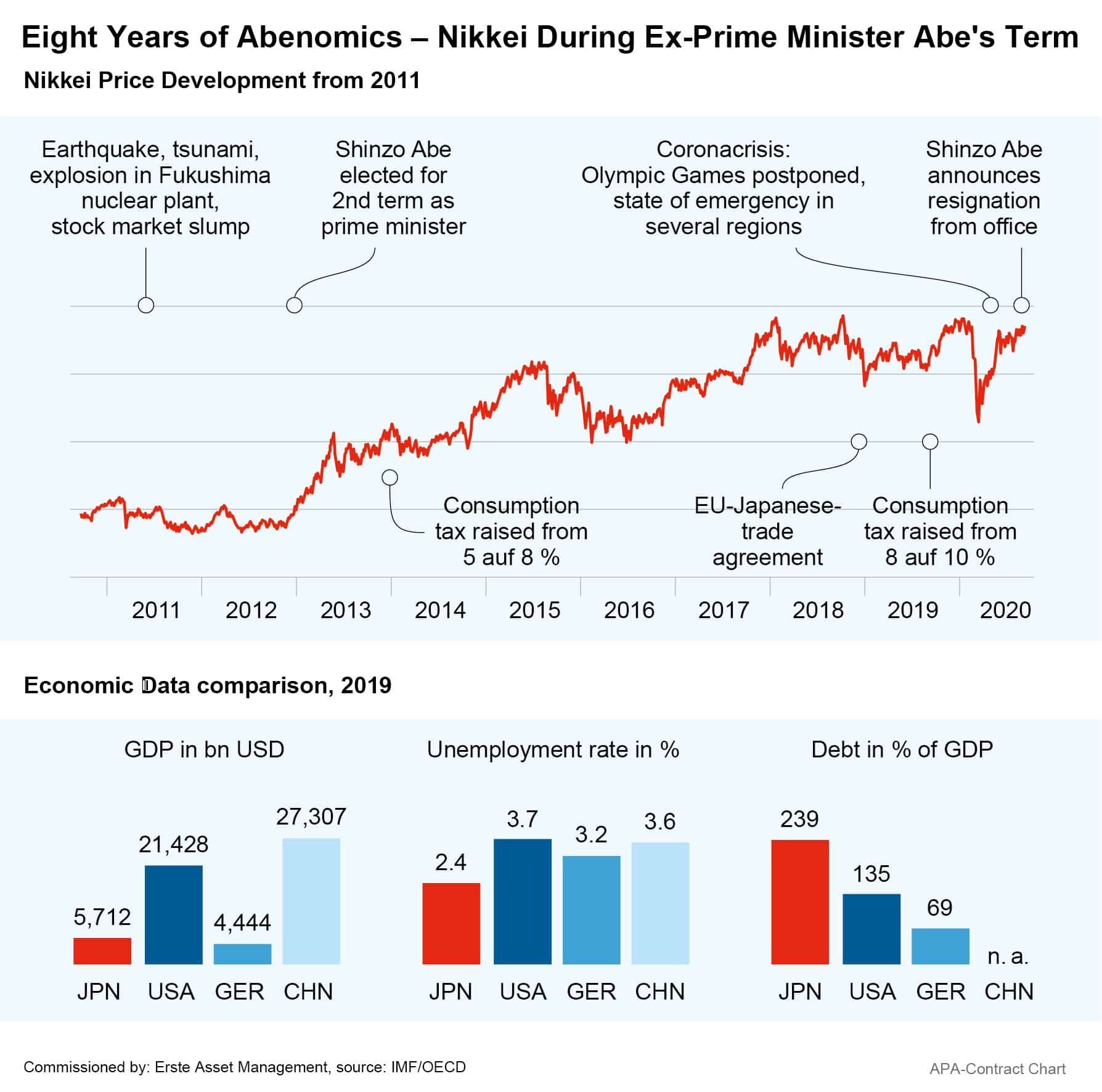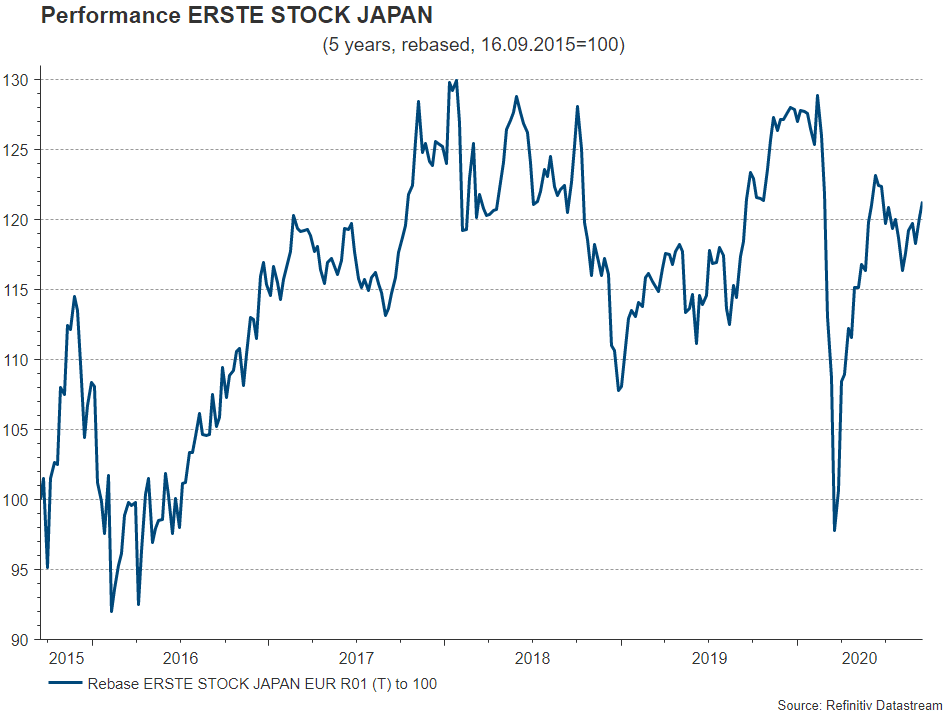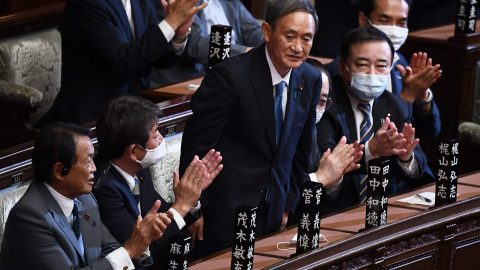
Japan officially entered a new era on Wednesday: As was expected, Japan’s new head of government Yoshihide Suga was elected Prime Minister by the majority of his Liberal Democratic Party (LDP), succeeding Shinzo Abe. Abe had announced his resignation in August for health reasons after having been office for nearly eight years. The successes of his economic policy, which has been dubbed “Abenomics”, were recently undone by the Corona pandemic, leaving 71-year-old Yoshihide Suga with major challenges to take on.
Following the outbreak of the corona crisis, the world’s third-largest economy has slid into the worst recession of the post-war period. Japan’s gross domestic product (GDP) dropped by a real annualised 27.8 per cent in Q2, marking the sharpest decline since comparative records were established in 1980. The country’s economy has already shrunk in the two previous quarters and is therefore now officially in recession. Even before the Corona crisis, Japan was already suffering from the consequences of the US-China trade conflict and an increase in consumer tax.
Japan in worst post-war recession
Private consumption in Japan declined by 8.2 per cent in Q2 compared with the previous quarter. As the country has not imposed any harsh quarantine measures, the decline in consumption was comparatively mild. However, the export sector so vital to Japan suffered a harder setback. According to the latest government data, exports dropped by 14.8 per cent in August – the sixth consecutive month with a double-digit decline.
Although economists expect an upswing of over 10 per cent for the current quarter, this forecast is all but certain. It remains to be seen how a possible second infection wave will affect the economy. Overall, experts expect a full recovery for Japan to take years.
To cushion the impact of the crisis, Abe’s government already signed off enormous economic stimulus programs. New Prime Minister Suga now plans to continue his predecessor’s economic policy as well as the “Abenomics” course of action. Under this slogan, Abe wanted to pull the country out of stagnation using a coordinated mix of extremely expansive monetary policy, debt-financed economic stimulus programs and reforms.
Abenomics brought expansive monetary policy and debt-financed economic programs
At Abe’s request, Japan’s central bank began drastically easing the monetary policy in 2013. Massive purchases of government bonds were supposed to keep interest rates and the Japanese yen low, combat deflation and provide the economy with liquidity. The central bank already has already accounted for 45 per cent of Japan’s national debt, and this low interest rate policy enabled Abe to implement extensive, debt-financed economic programs. In addition, reforms in the labour market, deregulation and a corporate tax reduction from 39.5 to 29.7 per cent were implemented.
Until 2018, the program did show promising results, with the economy growing, unemployment rates falling and share prices rising. The Nikkei index more than doubled during Abe’s term of office, outperforming other international indexes. One collateral of the program, however, is the drastic increase in national debt. With a debt level of 239 per cent of GDP, Japan currently clearly leads the OECD General Government Debt list, well ahead of the next most indebted countries, Greece (184 per cent) and Italy (157 per cent).

Suga plans to continue economic stimulus program and reforms to combat the crisis
Japan’s new Prime Minister Suga now essentially plans to continue his predecessor’s economic program, citing the fight against the coronavirus and the economic crisis as the most important points of his government work. Having been Cabinet Secretary under Abe, Suga was already responsible for the implementation of some reforms and now wants to initiate further reform projects. He has already hinted at the creation of a new agency for digital transformation and a reform of the country’s numerous regional banks.
In addition to the economic crisis, Suga also has to deal with other problems such as the aging society and foreign policy challenges. For example, relations with China, North and South Korea and Russia are currently strained. He may also call early parliamentary elections in Japan, and, finally, Suga must also decide how to proceed vis-à-vis the Olympic Games that have been postponed to 2021 due to the pandemic.
Political experts and insiders describe Suga as a “dry” and pragmatic “workaholic” who implements reforms “with an iron hand”, and, unlike colleagues like Abe, who frequently hail from dynasties of politicians, he comes from a relatively humble background, both of which gained him great support from the public. However, he only became a household name the year before, when the proclamation of the name of the new imperial era “Reiwa” earned him the nickname “Uncle Reiwa”.
Some analysts accuse him of a lack of vision, others praise his will to reform. According to observers, he owes his election to the party’s internal power plays, where he is probably regarded as a guarantee for stability and continuity in the crisis. Not only does Suga continue to rely on the “Abenomics” concept, but he is making few changes to his cabinet, leaving key ministerial positions unchanged.
US investor Buffet invests in Japanese equities
Suga has already received congratulations from abroad, from German Chancellor Angela Merkel and Russian President Vladimir Putin. Japan’s economic policy has also received advance praise from Warren Buffet this year. According to a report in the Financial Times, The USA’s most legendary investor began to invest massively in Japanese stocks for the first time with his holding company Berkshire Hathaway months before Abes announced his resignation. Buffet, who is famous for his investments in long-term turnarounds rather than short-term speculation, is thus likely banking on the long-term success of Abenomics.
Invest in Japanese equities with the ERSTE STOCK JAPAN fund
The ERSTE STOCK JAPAN fund offers the opportunity to invest in a broadly diversified range of companies listed on the Tokyo Stock Exchange. As with any equity fund, there is the chance of an attractive increase in the value of the invested capital. The potential risks, such as high price fluctuations, currency risk due to the Japanese yen, must be kept in mind. The ERSTESTOCK JAPAN has achieved an annual increase in value of 4.5 percent over the last 5 years. This year it is still 4.5 per cent down due to the corona distortions of spring (source: Reuters Eikon), but has caught up strongly.

Risk note: Past performance is not a reliable indicator of the future performance of the fund.
Legal note:
Prognoses are no reliable indicator for future performance.
Legal disclaimer
This document is an advertisement. Unless indicated otherwise, source: Erste Asset Management GmbH. The language of communication of the sales offices is German and the languages of communication of the Management Company also include English.
The prospectus for UCITS funds (including any amendments) is prepared and published in accordance with the provisions of the InvFG 2011 as amended. Information for Investors pursuant to § 21 AIFMG is prepared for the alternative investment funds (AIF) administered by Erste Asset Management GmbH pursuant to the provisions of the AIFMG in conjunction with the InvFG 2011.
The currently valid versions of the prospectus, the Information for Investors pursuant to § 21 AIFMG, and the key information document can be found on the website www.erste-am.com under “Mandatory publications” and can be obtained free of charge by interested investors at the offices of the Management Company and at the offices of the depositary bank. The exact date of the most recent publication of the prospectus, the languages in which the fund prospectus or the Information for Investors pursuant to Art 21 AIFMG and the key information document are available, and any other locations where the documents can be obtained are indicated on the website www.erste-am.com. A summary of the investor rights is available in German and English on the website www.erste-am.com/investor-rights and can also be obtained from the Management Company.
The Management Company can decide to suspend the provisions it has taken for the sale of unit certificates in other countries in accordance with the regulatory requirements.
Note: You are about to purchase a product that may be difficult to understand. We recommend that you read the indicated fund documents before making an investment decision. In addition to the locations listed above, you can obtain these documents free of charge at the offices of the referring Sparkassen bank and the offices of Erste Bank der oesterreichischen Sparkassen AG. You can also access these documents electronically at www.erste-am.com.
Our analyses and conclusions are general in nature and do not take into account the individual characteristics of our investors in terms of earnings, taxation, experience and knowledge, investment objective, financial position, capacity for loss, and risk tolerance. Past performance is not a reliable indicator of the future performance of a fund.
Please note: Investments in securities entail risks in addition to the opportunities presented here. The value of units and their earnings can rise and fall. Changes in exchange rates can also have a positive or negative effect on the value of an investment. For this reason, you may receive less than your originally invested amount when you redeem your units. Persons who are interested in purchasing units in investment funds are advised to read the current fund prospectus(es) and the Information for Investors pursuant to § 21 AIFMG, especially the risk notices they contain, before making an investment decision. If the fund currency is different than the investor’s home currency, changes in the relevant exchange rate can positively or negatively influence the value of the investment and the amount of the costs associated with the fund in the home currency.
We are not permitted to directly or indirectly offer, sell, transfer, or deliver this financial product to natural or legal persons whose place of residence or domicile is located in a country where this is legally prohibited. In this case, we may not provide any product information, either.
Please consult the corresponding information in the fund prospectus and the Information for Investors pursuant to § 21 AIFMG for restrictions on the sale of the fund to American or Russian citizens.
It is expressly noted that this communication does not provide any investment recommendations, but only expresses our current market assessment. Thus, this communication is not a substitute for investment advice.
This document does not represent a sales activity of the Management Company and therefore may not be construed as an offer for the purchase or sale of financial or investment instruments.
Erste Asset Management GmbH is affiliated with the Erste Bank and austrian Sparkassen banks.
Please also read the “Information about us and our securities services” published by your bank.



